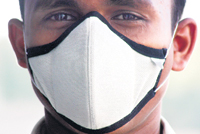|
Special masks for motorists, pedestrians The Haycarb group, part of the giant Hayleys conglomerate, sensing a good business opportunity due to high pollution levels on local roads is launching one of its first-ever products for the local market – a mask to protect motorists and pedestrians.
The mask has a coating of activated carbon which filters and absorbs all poisonous air and allows the user to breathe clean air in whatever environment on Colombo’s pollution-filled streets. Until now, Haycarb which has a world famous reputation for quality activated carbon hadn’t produced any product for the local market. So why now? Why has the strategy changed? “In Sri Lanka there hasn’t been any demand for such products and it’s only now that people are aware of pollution and the environment. Pollution has led to health problems making it possible now for us to make a product and market it here,” a spokesman for the company said in a recent interview. Haycarb’s core product is coconut shell based activated carbon which caters to special high value and exclusive applications. Global demand for this product is rising by 8-10 percent a year and the Sri Lankan group with its installed capacity of 20,000 metric tones is the world’s single largest producer, meeting almost a sixth of global needs. The spokesman said the Sri Lanka market alone is not the main strategy. “We want to test market the product here and then go into the (South Asia and Asian) region. Those days only the west was conscious of the pollution factor. Now many other countries in Asia are worried about pollution levels which are horrendous in the region,” he noted adding that there are not many products in the region of the type that Haycarb plans to market while the ones from the west are too expensive. The special filter mask has been initially tailored for motorists (a fasionable Velcro one) and pedestrians and is to be priced at less than Rs 100 per mask. “Our masks could be used for a month and that’s a reasonable price (Rs 100) to pay for protection against sulphur dioxide fumes and useful in today’s context of pollution on the roads,” the spokesman said adding that the mask that policemen use for protection is just like using a handkerchief and doesn’t protect against bad air. The company hopes to make 500,000 masks a year with plans later to establish the product fast in the Indian markets. The masks, made of fabric, will also soon be produced for farmers and industrialists. “Farmers buy a mask from the hardware shop which doesn’t help though it has a filter,” the spokesman said. Another reason why Haycarb has got into marketing and selling its own products now is because it didn’t want to compete with its overseas buyers – companies that buy Haycarb’s activated carbon to produce a range of products including masks. The company is making sure it would be in markets where its buyers are not competing. Haycarb went through a bad year in the 2005-2006 financial period owing to high prices of coconut shells and a shortage in the market but sees the current year as positive and bright.
|
||||
Copyright © 2006 Wijeya Newspapers
Ltd. All rights reserved. |
